Interview: Status Quo – No Substitute For Class
Following the release of a new ‘definitive’ hits collection, Accept No Substitute, we speak to Francis Rossi and Rick Parfitt as Status Quo hit the road again.

When Rick Parfitt speaks to Guitar & Bass from his home in Spain on the eve of Status Quo’s Accept No Substitute UK tour, the band are taking advantage of some enforced downtime to carry out the daunting task of compiling a definitive setlist from 32 albums of material.
“I’m actually resting up from a recent hefty shoulder operation,” says Parfitt. “For the last three years, I’ve had several pulled ligaments and split tendons. I’ve been told recovery time is six months, but that ain’t gonna happen.
“I’ve never done what I was told, so why change now? I haven’t picked up a guitar for a month, but I’ll probably start playing again in about a week, as the arm is getting stronger.”
A call to co-guitarist and frontman Francis Rossi, with whom Parfitt has been sharing a stage for over half a century, confirms he’s also been enjoying the band’s recent inactivity. Reflecting on the process of honing the setlist for last December’s tour – which will be followed by a series of outdoor shows in the UK and Switzerland in May, July and August – and selecting tracks for the 3-CD ‘greatest hits’ album released last autumn, he explains: “There’s a lot of material to choose from, and I think the package is rather good. I’m pleased it has material that recognises the band’s latter years as well, when I think we’ve recorded some of our best songs. There’s also a lot of nostalgic stuff from the early Quo years and the Frantic 4; but I don’t think the new band was great and the old one shite, or vice versa, which some of the early hardcore fans said when we did the Frantics – I can’t help but disagree with that.”

The Quo continue to put significant effort into rehearsing for live work. “We always find the UK tour a pressure, I really don’t know why, and the Accept No Substitute tour is no exception,” says Rossi. “The adulation and the feeling onstage in the venues are tremendous, but I enjoy walking up to my bedroom in the back of the bus afterwards, it’s like anyone else who finishes work for the day. We’ll rehearse the songs and there may be some tweaks here and there. There was a time when Rick had the idea of opening with Down Down; it seemed good on paper, but about 10 shows in, he said ‘you were right, it doesn’t work’. If we put Caroline in the middle it becomes positively pedestrian, but at the front it’s urgent, so why would we put it somewhere else? You learn in showbiz how a set should work, what keys follow what beats – a shuffle or a straight eight for example. We do seem to have it down to the ultimate, but we will rehearse the crap out if it, believe me.”
“This is a must-have for the serious Quo fan and for the floating fans that come to see us now and again,” says Parfitt of Accept No Substitute. “It’s like a timeline – I look at the pictures, especially from the 70s, and see what we were up to and the fun we had recording certain albums, I can’t believe it’s around 32 now. I didn’t like to change from vinyl to CD, but it was inevitable; it had to come, like everything else that was leaping forward. It just didn’t suit our sound, but we’ve adapted to it now and can compensate for it being so clean; but there was something special about vinyl that suited Quo so well.”
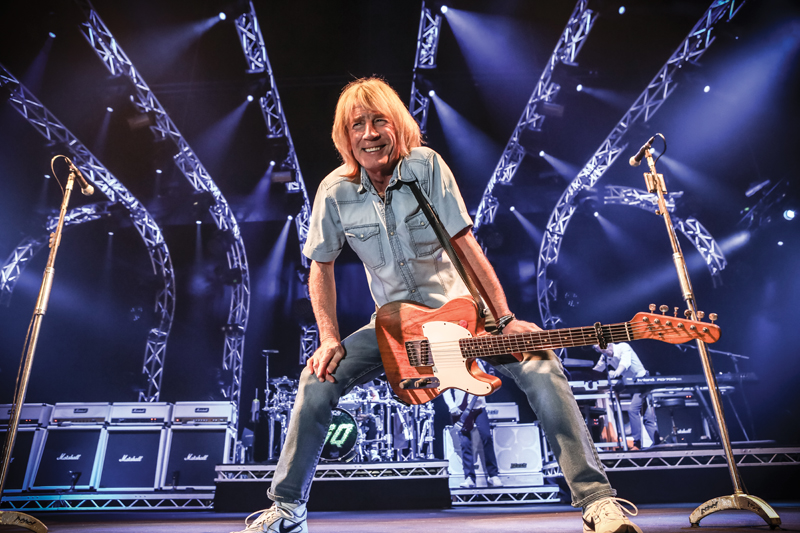
Quo have also witnessed big changes in the live arena since they started gigging in the 60s. “It’s all technical now,” says Rossi. “There’s no desk, you adjust it all on a screen, but we are all in the same boat so we just have to get on with it. It’s just not so natural as it used to be, it really annoys me now with some of these so-called boy and girl bands and other people in our business who get away with murder; there’s no need to be able to sing, play or do anything anymore – they go out, fill an arena and mime to backing tracks. If we go back to the early days, you had to be able to perform and do it well or you wouldn’t last – I guess that still relates to us.
“Back then, nobody really gave a fuck, we just all piled in one studio room, sat in a circle and looked at each other with the amps up really loud. A lot of overspill down the mics played a big part in our sound on vinyl, but those days are long gone now and they’ll never come back. It was a great experience to record in a way that seemed so natural. I’m not sure, though, if digital was to blame or we were just drifting off. In the early 80s, everyone was using different reverbs, big snare drum sounds and synths; you can see where we followed, then whoops – we’d drift back and forth again. Around the mid-90s, we got it back. We were even told we were drifting when we did the Rocking All Over The World album; it’s difficult to progress in a band like Quo, because a lot of fans don’t want it to move, maybe it was because they had such great times back then.”
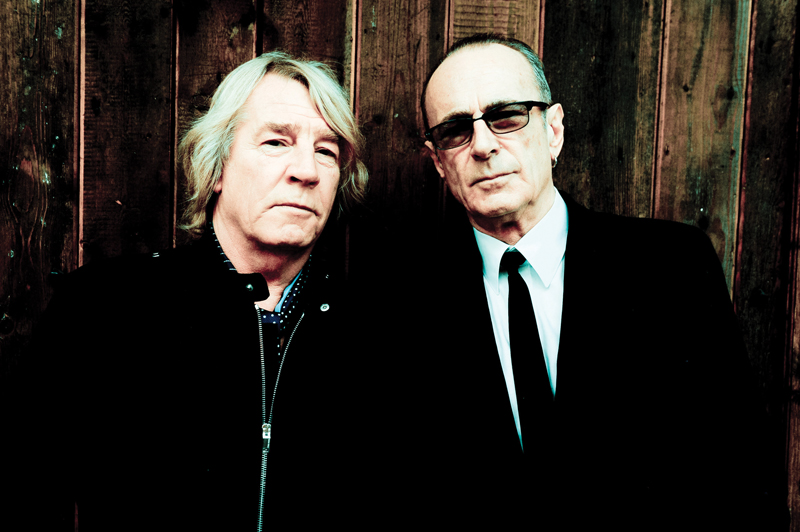
Rossi has fond memories of 2014’s Frantic 4 reunion tour, which saw Rossi and Parfitt reunited onstage with Alan Lancaster and John Coghlan. “I must admit, the Frantic 4 tour was very nostalgic,” he says. “I looked up at the crowd on the balcony at the London Hammersmith gig, it looked like they were mesmerised at something that was going on behind the band. I thought, ‘what the fuck are they looking at?’. I’ve never, ever experienced euphoria from an audience like that before, maybe they wished we’d stayed in that era and just released albums of all those tunes one after another.
“The classic Quo albums would always have a ballad here and there that Rick wrote, like Living On An Island for example, or Alan Lancaster would lean towards Del Shannon, and the blues and country feel from myself and Bob Young.
“With albums like Pile Driver, Hello Quo! and On The Level, I think we’d reached a point. Then when heavy rock was out there, you had to put a fist in the air, get a tattoo and pull a face, but that was never really Quo.
“I miss those days when we could just make a record. The best thing about Bula Quo! was it wasn’t a Quo album, just songs from the movie, which was fine; we could do anything at that point, then we had to come back to do something in the Quo vein.”
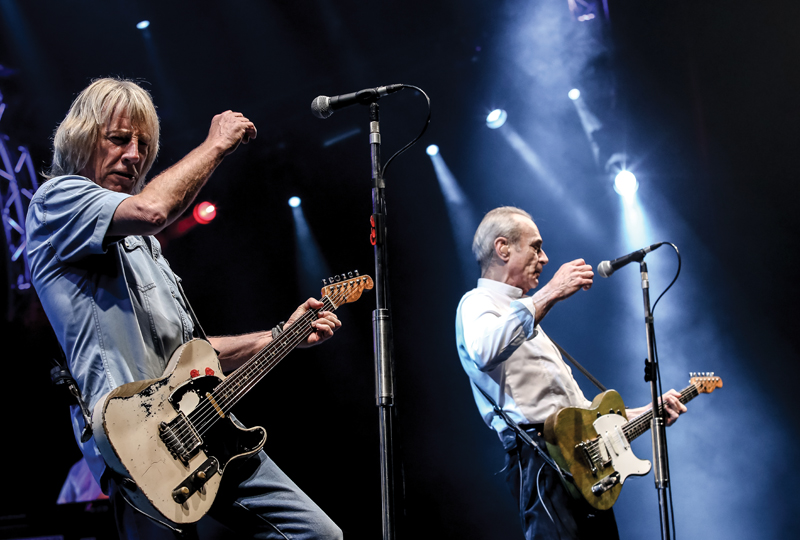
Rossi dismisses the oft-repeated notion that Status Quo songs are all simplistic reworkings of the same three-chord formula.
“I heard someone say on the radio recently that Quo was the same song with the same three chords,” he says. “If we had been Berry Gordy we’d have got an entire record company and a lot of other bands to do it, at least Quo did it within one band. I’m not being negative about Tamla Motown, but it’s all the same backing tracks and sounds with different acts on the top, so whilst us humans say we want something different all the time, we don’t; it’s the same with everything in our lives, hence you can go anywhere around the planet and get a McDonalds or a Burger King.”
Rossi admits to initially having reservations about the band’s 2014 acoustic album – Aquostic (Stripped Bare). “It was totally different of course,” he says. “First, I thought, ‘It’s acoustic, where’s that thing that we love about Quo gone?’, then I’m thinking, ‘This is good innit?’. I realised that a lot of the songs that I may have slagged off over the years have lovely little melodies, and people were coming up to us saying they didn’t know we wrote such nice songs. I don’t know what they’ve been listening to then,” he laughs.
“I enjoyed it immensely and would like to take it further, as the full-blown rock set is physically getting harder, and like a lot of rock bands we struggle with the decibel limit. I have a fucking lawnmower at home that has ‘97 decibels’ written on the side, this is close to the live venue limit and I’m thinking, ‘Is this how loud we are now?’. I have sensitive hearing, that’s why I use the in-ear monitoring. I think as I’ve gotten older, I’ve sweetened it a little, whilst Rick didn’t take to in-ear, his ears are dulling, he’s got louder and brighter on stage.”
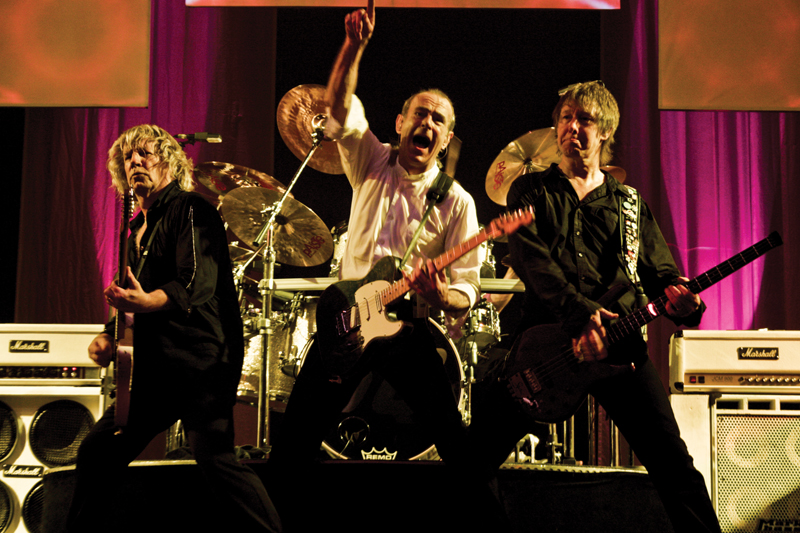
The Quo have also waded through decades of technology changes within live sound, but Rossi someitmes yearns for a return to more simple times. “We get asked if we could drop in and do a gig with just a guitar and an amp, but it’s not like that anymore, in a way I wish it was,” he says.
“What goes on behind the line of Marshalls is all highly technical, which I don’t really understand. There are racks of stuff; sometimes it hisses and hums or cuts out, and I’m thinking ‘there are millions of pounds of equipment here that does this and that, why don’t we get rid of it all?’ I’m a simple man when it comes to rock ’n’ roll,I don’t want any of that bollocks, I don’t understand it. I just want to give the guitar a good bash backstage to make sure all is well, then go out and fucking play it quite loud, then I’m happy – it don’t take a lot! We still use a combination of Vox and Marshall amps. I have the Marshalls coming straight at me on stage, which is mixed with a Vox AC30 in an isolation box behind the backline.”
Hardcore Quo fans will also have noticed a recent guitar change on stage, as Rossi explains: “I suddenly started to get serious tuning problems with the green Tele. Rick plays a lot of route and fifths and I put a lot of thirds into the chords, which can sound really sour if it’s not bang in tune. It’s back at Fender with Mark Preston, their custom guy.
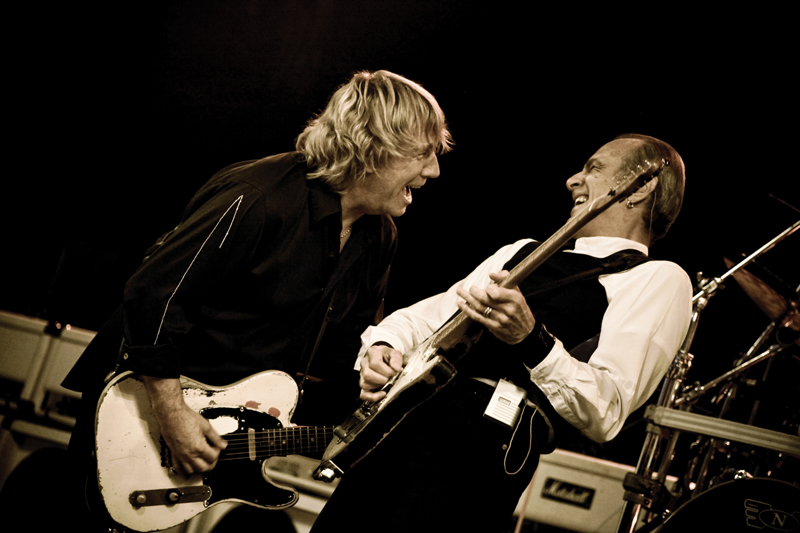
“John (Rhino) Edwards has always been happy with his Status Graphite basses, made by Rob Green, and said why not ask him to make me a guitar? Then the old-school thing kicked in and I was being told by some folk, ‘no, it should be wood instead of graphite’. I had one made in a Tele shape with a grey finish, but I couldn’t take to it. Then he came to rehearsals with another finished in green.
“I started talking through my teeth, saying, ‘I don’t need another guitar, let alone a green one’. I plugged it in and went, ‘oh’, and I’ve been playing that ever since. He makes lovely guitars. I call them donkey’s knob guitars, if you know what I mean, I can’t talk highly enough about them. It feels a bit odd sometimes when I look down and it’s not my original green Tele, which I’ve been playing since I was 19.”
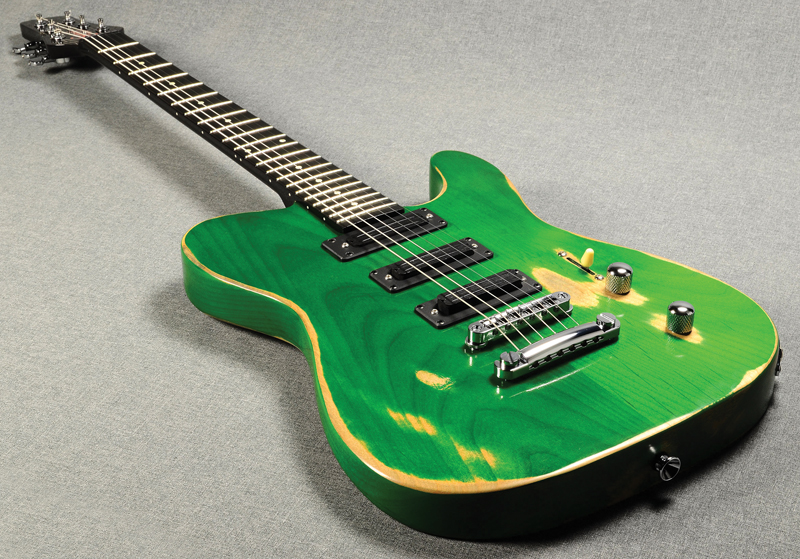
“There’s a wonderful balance and solid feel about these guitars, especially the neck,” says Parfitt, who plays a Status Graphite Slipstream. “Although they’re a lot more modern, it’s not that dissimilar in the feel and neck profile to my white ’62 Tele, which is an amazing piece of kit. It’s heavily strung, I let very few people near it, and those who have say, ‘how the fuck do you play it?’.
“I’ve never claimed to be the most technical guitarist in the world – far from it. I do what I do, and nobody else seems to do it, most players strive to play complicated lead breaks. I started out to be just a rhythm player. Malcolm Young of AC/DC is the only rhythm player that comes to mind who plays the same way – no frills, just get your head down and do it.
On tour with Quo
Lloyd Gilbert has been guitar tech for Rick Parfitt and Francis Rossi for the last 10 years. “We take eight guitars on tour,” he says. “These include Francis’s grey custom-built Status Graphite as a back-up to his green model, which is more or less a hybrid Tele carved from a slab of ash with a graphite neck, stop tailpiece and loaded with three Hot Rails pickups. The Graphite guitars are working well, although I don’t think we’ve seen the last of the original green ’59 Fender. Rick also has a back-up red Status Graphite Slipstream.
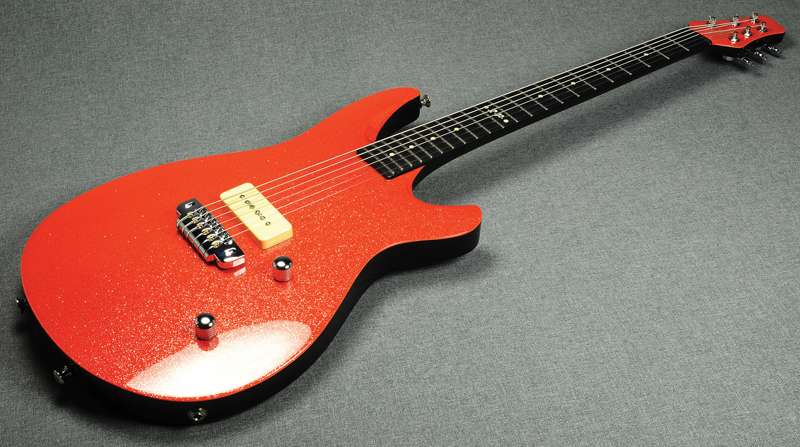
“Rick’s number one is still his well-worn ’62 Tele, which he plays with such ferocity that it often comes back covered in blood. He plays mostly over the lower DAE strings, with the guitar on an acute angle, so his strumming hand, especially his third finger, catches the edge of the Tele’s cut-down ashtray bridge.
“It’s been strung with 14-56 gauge strings with a 26-wound G for over 40 years, and I’ve never had any trouble with the neck. I’ve strung other Teles with this string gauge and had a banana for a neck before reaching pitch. We also have a ’57 Esquire in open G with a capo at the second fret, which Rick uses for the likes of Rain and Mystery Song. Rick also has a back-up ’62 Tele in regular tuning, on which he’ll drop tune the low E to D onstage for Whatever You Want.
“It’s amazing how the old Teles have survived so much punishment over the years; I’ve likened them to Francis with the Rolls Royce, as he has a lighter touch, and Rick with the rugged Land Rover!”
“A lot of players think Quo stuff is easy, until they try, and they realise they fucking can’t do it. You have to be committed and go for it 100 per cent or don’t go for it at all.”
For more information on the Accept No Substitute UK tour and the Accept No Substitute: The Definitive Hits 3-CD and 2-DVD package, see the band’s website at www.statusquo.co.uk
Story: Lars Mullen
